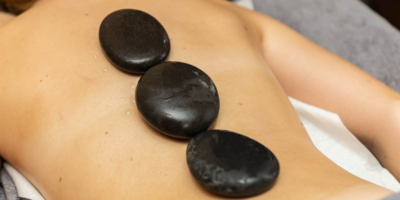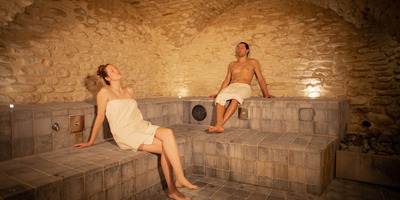
Less muscle pain thanks to a Hot Stone Massage
- Beauty - Beauty
The warmth of the volcanic stones is not only incredibly relaxing, it also relieves pain!
1

With so many of us suffering from stress, are you taking the time to press the pause button as and when you need to?
Read the entire article
Halo in the word halotherapy has its origins in the Greek word for salt, halos. As early as the 19th century, doctors in Eastern Europe discovered the health benefits of salt. They noticed that the miners working in the traditional salt mines rarely suffered from respiratory problems or other diseases. While halotherapy is not a curative treatment, it may help alleviate respiratory symptoms up to 85% and could also be a supportive treatment for allergies.
These days, many of us are constantly chasing our tails and/or suffer from stress. While a little bit of stress is harmless, chronic stress results in an increased risk of all kinds of health problems. Salt therapy is a natural treatment method recognised as having potential benefits for certain skin conditions and respiratory problems but so far, very little research has been done into its effects on stress.
That said, scientists suspect that halotherapy may reduce stress because it regulates breathing, which automatically makes you feel more relaxed and helps you sleep better. Halotherapy opens up your airways, allowing you to breathe in more oxygen. It also reduces phlegm, which means fewer night-time coughing fits and so, less disrupted sleep.
The vibrations in the salt room have a relaxing effect on your body and this triggers the production of more serotonin, a mood-boosting hormone.
Finally, it is also quiet in a salt room (or there may be calming music playing softly in the background) and it is a low-stimulus environment. Unsurprisingly, then, spending half an hour in this room is wonderfully relaxing.

- Beauty - Beauty
The warmth of the volcanic stones is not only incredibly relaxing, it also relieves pain!

- Promo - Promo
Your birthday is the perfect time to reflect on the past year and look to the months ahead. And what better way to do so than by enjoying a great-value sauna day?

- General - General
Blue Monday, the third Monday in January, can make you feel gloomy and miserable. It’s when the winter blues are really starting to creep in. Read on to find out how warmth, sauna and massage can relax you, boost your mood and give you a gentle start to the new year.
We use cookies to improve your experience on our website.
Don't forget to complete your reservation
Dear guest, please remember to complete your reservation. You currently have 5 minutes left to make this reservation.
Booking cancelled
Dear guest, the reservation time limit has expired.
SPECIAL OFFER: Multi-visit pass deal